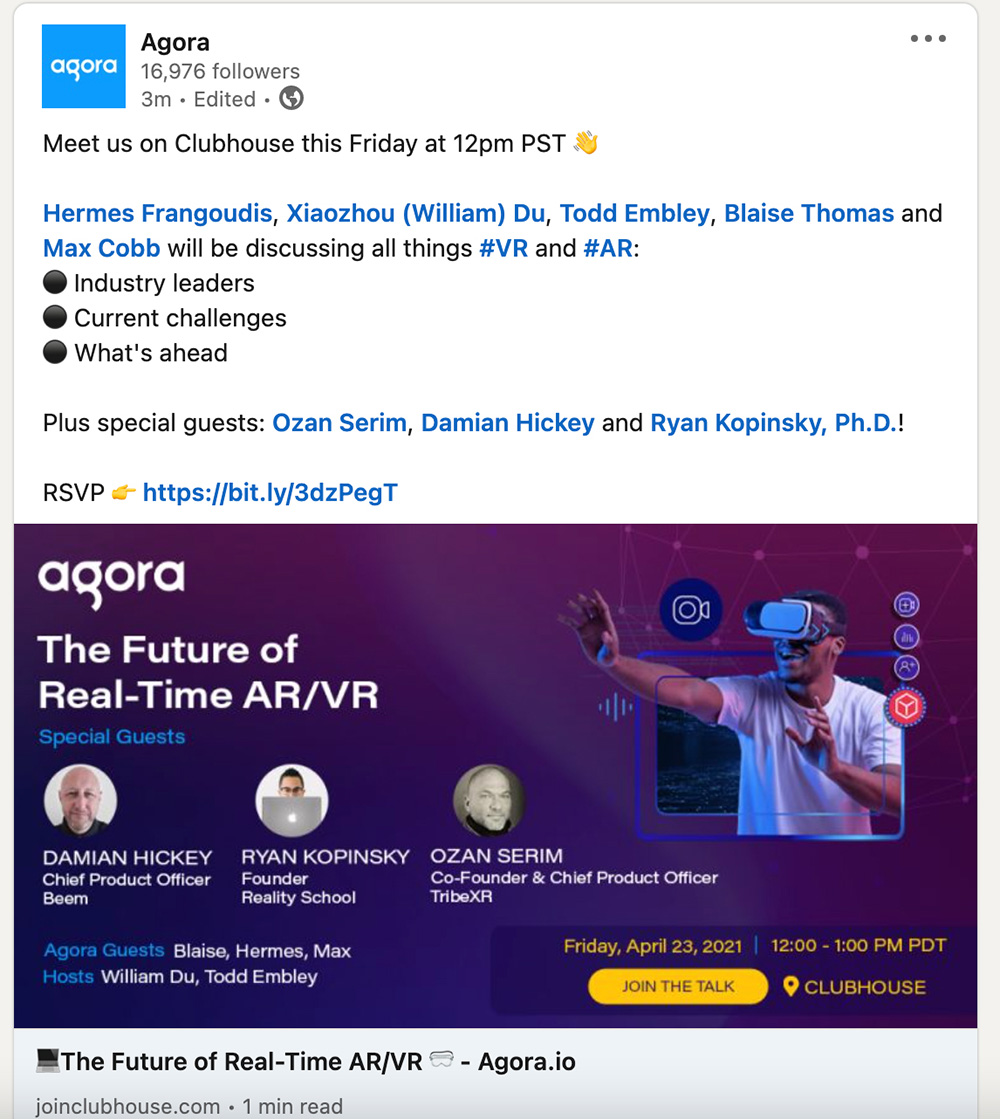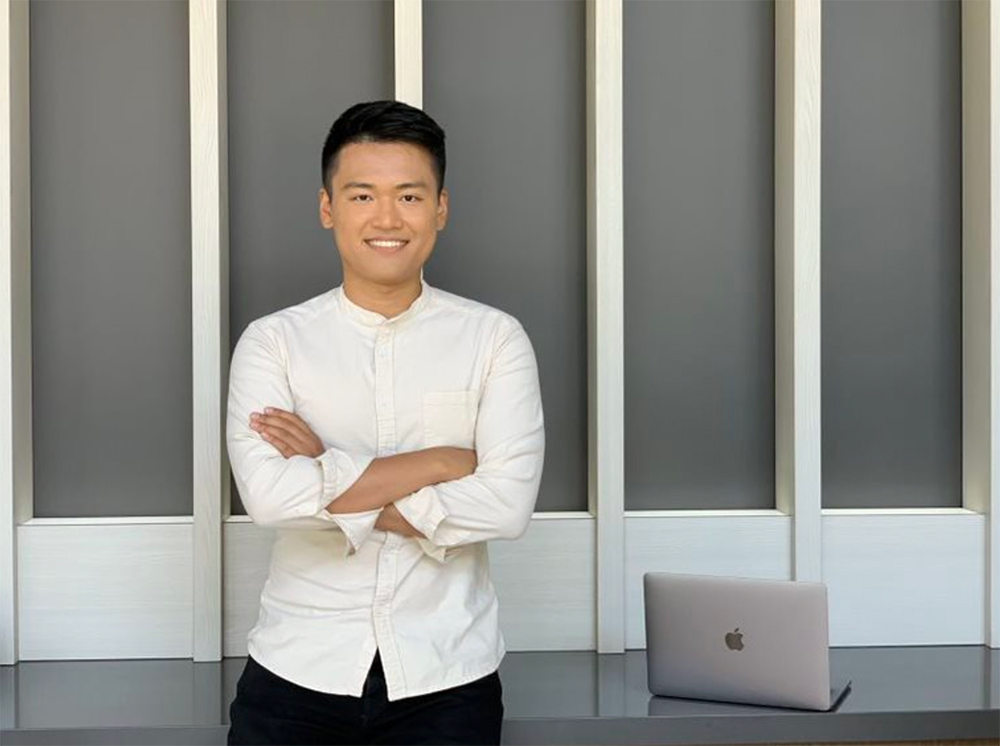Xiaozhou (William) Du is a Startup Program Manager at Agora. He has a strong background in both the business and technology fields. With a strong passion for the high-tech industry, startup community, and innovation, William is now working to help startups launch the latest innovation, push the boundary of Real-Time Engagement, and reimagine the future of user engagement. You can also learn more about William Du and his past experiences from the interview.
Hello William, what is your current position in Agora, and what is your responsibility for the role?
Recently, I have transitioned from the Developer Community Manager to the Startup Program Manager. As a startup program manager, I usually spend a lot of time with our startup community. More than hundreds of startups are using Agora’s products and services to build a culture of innovation. I also communicate with our partners, which includes Venture Capital Firms, Accelerators and Incubators to help develop their objectives, and ensure the achievement of their goals with Agora’s products and services.

Before you transition to the Startup Program Manager, you are a developer community manager. What is the role of a developer community manager?
As a Developer Community Manager in Agora, I need to figure out the shared goals and create a collaborative environment for the community. Essentially, my job is to make developers feel excited about the product and innovation. For example, I led the whole team, launched the developer education program, and organized developer events. I will say this role is involved in a triangle relationship. The relationship is about marketing, communication, and Program Development – the good thing is that I have a background in marketing and technology. I enjoyed my experiences as a developer community manager.
Can you please explain a little more about Agora and its products and services?
Agora is a leading video, voice, and live interactive streaming platform. Our company is committed to helping developers deliver rich in-app experiences, including embedded voice and video chat, real-time recording, interactive live streaming, and real-time messaging. You can imagine our product as a toolbox. Our consumers and partners can use this toolbox to build any real-time engagement application for users on every platform.
You talked about “Real-Time” several times. How would you define a “real-time engagement”?
Before I talk about Real-Time Engagement (RTE), I’d like to talk about Real-Time Communication (RTC) first. VoIP and live video are common ways of RTC. For example, we are having a virtual meeting – the virtual conference is an excellent example of the application of RTC. However, these communication tools, such as FaceTime, still cannot provide an immersive experience as face-to-face communications do. Compared to RTC, Real-Time Engagement has a strong interaction and engagement among users. People can share the same environment, hear the same background sounds, and see the same sights over their devices. In addition to the high-tech field, RTE can provide strong support for some traditional industries. We have clients from the healthcare, education, and retail industry. They can also use our products and services to scale with their business. So, we are trying to develop RTE tools with extremely low latency, high convenience, and flexibility.

Why do you want to join Agora? Where do you get your inspiration?
I am passionate about the high-tech industry because the overall positive work environment is full of challenges and creativity. I can use my skills, strengths, and talents to create value. I like Agora’s vision, which is totally in line with my personal career goal. We want to change the way people communicate; even though these real-time voice and video solutions were not easy to develop, we are imagining the future and trying to create the best solution. I also like the way Agora helps the startup community. Agora is always there to provide support to startups. Working at Agora allows me to work in the field of high-tech and startups. I enjoy discussing the cooperation projects in the real-time engagement field and forecasting the technology development in the next five to ten years.
Can you talk more about your skill set in business fields?
I have a relatively broad skill set. On the one hand, I have a bunch of business consulting skills. I enjoy problem-solving and helping people. I always put our partners’ wants and needs first. I have great communication skills as well. On the other hand, I have coding experience, which helps me be a professional in a high-tech company. I am interested in technology, so I always keep myself updated about the latest tech news for the high-tech field. I think the combination of business and technology knowledge makes me unique.
How did you develop your unique skillset from your past experiences?
I joined the Business Consulting Group when I was at school. The Business Consulting Group is committed to providing help to small and medium-sized companies and underrepresented communities to help them solve operational problems. With the help from group leaders who are professionals in various fields, I developed my skills in business consulting. I also participated in the AngelHack Global Hackathon. The Hackathon provided me with a valuable vision, experience, and passion for innovation to get into the high-tech industry and join Agora.
I’m so interested in your Hackathon experience. Can you tell us more about the AngelHack Global Hackathon?
The AngelHack Global Hackathon is created to bring new ideas to the world and make changes with the community of code creators and change-makers. When I was in the competition, our team placed 1st out of 30 teams in Seattle. We are invited to San Francisco to compete with 200 vibrant teams. I really appreciate the opportunity to communicate with them and share our ideas about the future.
What is the project you developed when you were in the competition?
During the competition, my team launched OneArc, an emergency information solution platform that can help natural disaster survivors locate resources. The solution received much positive feedback from NGO and state governments. We also get the opportunity to move forward with the Oklahoma State Government and help them to provide a reliable disaster information system in the state.
How does your Hackathon experience benefit you in your career development?
Being on both sides of the Hackathon competitions as a participant and an organizer, I have more edge than other community program professionals in the field. To better serve developers, I need to understand and analyze the competing environment. I sat in the front row witnessing how innovators and entrepreneurs utilize technologies like Agora’s to imagine the future of user engagement. By having strong empathies towards, I have a great understanding of what the developers and founders are looking for and struggling with. I strive to eliminate the struggles and create smoother processes for the community. Moreover, I gained some skills in analyzing clients’ needs. Obviously, the Hackathon also improved my business communication skills. After engaging in the Hackathon, I always transfer the skills to my daily job. That’s the reason why my Hackathon experience benefits me a lot in my career development as both Startup Program Manager and Developer Community Manager.





